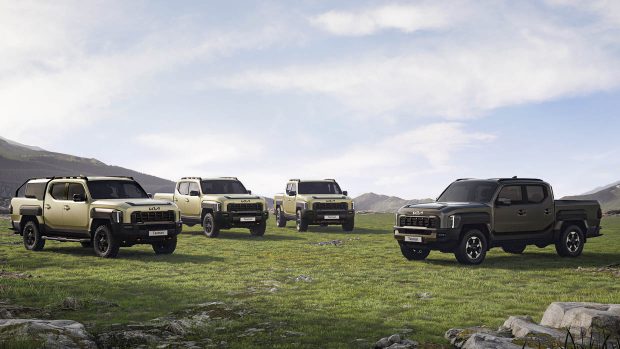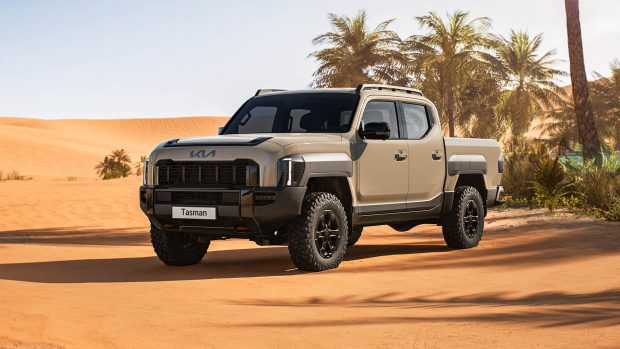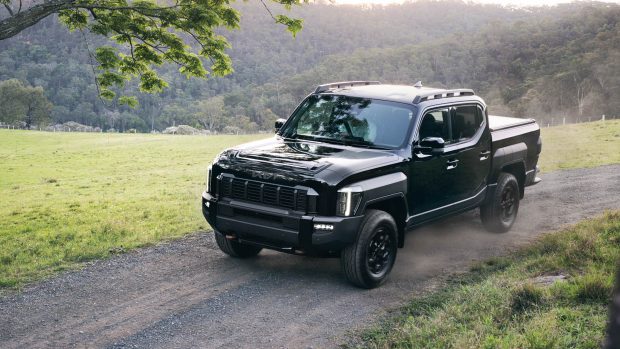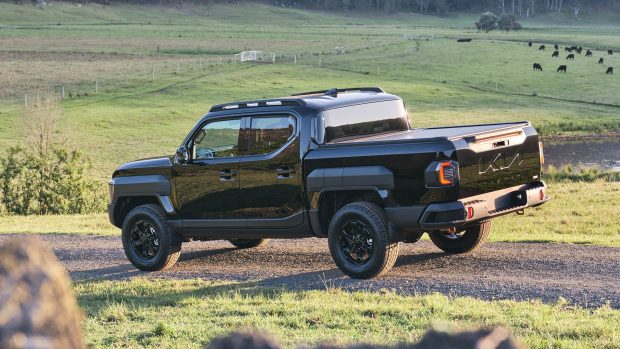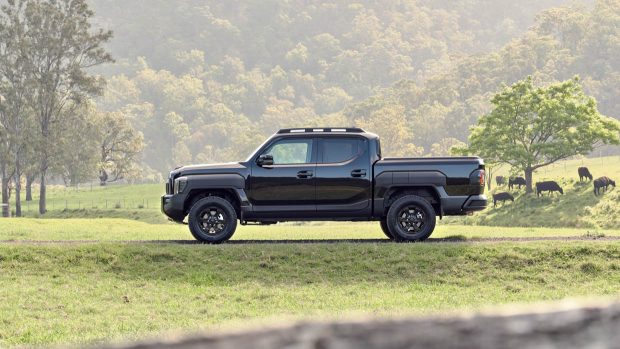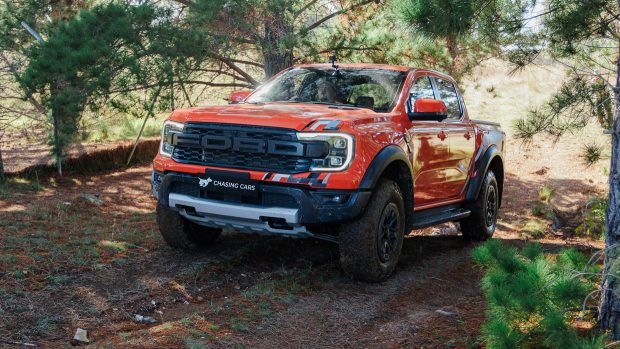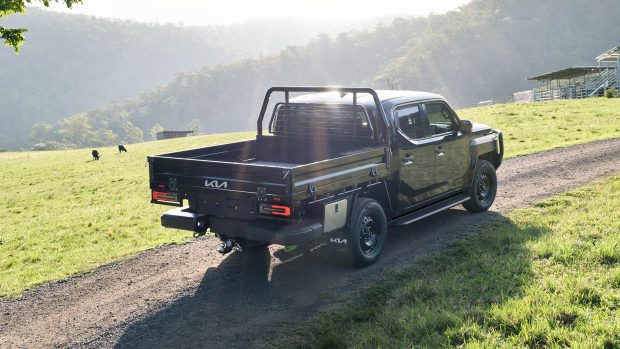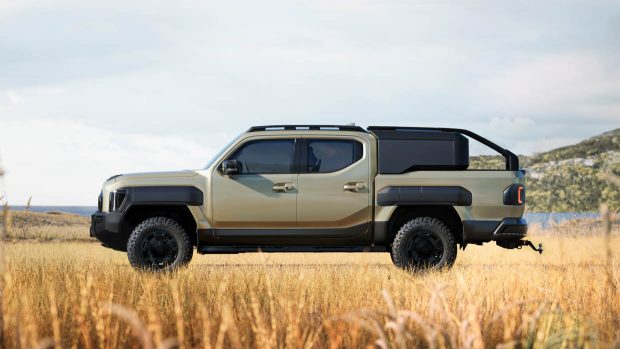-
Car Reviews
- All reviews
- Midsize SUVs
- Small cars
- Utes
- Small SUVs
- Large SUVs
- Large cars
- Sports SUVs
- Sports cars
- Vans
Latest reviews
- Car News
-
Car Comparisons
Latest comparisons
- Chasing Deals
Kia’s first-ever ute will launch with four-cylinder turbo-diesel power, but what types of powertrains can we expect to join the lineup down the track?
While the exterior design of the Kia Tasman has dominated much of the online reaction since the highly anticipated ute was unveiled last week, the powertrains – or powertrain – has been the next-hottest topic.
Launched exclusively with 2.2-litre turbo-diesel power, much of the recent speculation about the vehicle has focused on what might lie ahead for the Tasman in terms of more-powerful petrol variants, as well as hybrid and electric options.
Let’s take a look at what’s confirmed, what’s been hypothesised, and what we’re expecting to see down the track.
The sole powertrain option available at launch in Australia will be Kia’s familiar 2.2-litre turbo-diesel inline-four cylinder engine that’s also found in other models such as the Sorrento large SUV and Carnival people mover.
This engine produces 154kW of power and 441Nm of torque, which matches key rivals such as the Ford Ranger for power but not torque – that model features a 2.0-litre twin-turbo diesel four cylinder outputting 154kW/500Nm.
In the Kia, the powertrain is mated to an eight-speed automatic transmission exclusively – no manual is offered – and Kia claims that it can accelerate from 0-100km/h in 10.4 seconds and deliver a maximum speed of 185km/h.
In Korea, the Tasman will be available with a 2.5-litre inline-four cylinder turbo-petrol engine, also mated to an eight-speed automatic transmission.
The turbo-petrol engine delivers more power (206kW) and less torque (421Nm), yielding a faster 0-100km/h acceleration claim of 8.5 seconds; top speed is unchanged at 185km/h.
Middle Eastern and African markets will be able to choose between both the turbo-diesel and turbo-petrol fours, however the 2.5-litre isn’t slated for Australia.
The lengthy pre-launch hype-train for the Tasman saw much speculation about a potential high-performance variant, potentially utilising the twin-turbo V6 found in vehicles such as the Kia Stinger and several Genesis models.
That 3.3-litre engine makes for power outputs of 274kW/510Nm, which would give opportunity for higher-power mainline variants.
However, this looks unlikely, at least for now, mainly due to the upcoming New Vehicle Efficiency Standard in Australia.
Speaking to Chasing Cars post launch of the Tasman last week, Kia Australia’s general manager of product planning Roland Rivero said: “I understand the halo effect of a Raptor-like vehicle, but we’ve got to be mindful of what’s coming”.
“CO2 regulation will be here and if anything we’re looking at that V6 petrol that’s currently being used in our other vehicle lines, whether their respective mixes and roles are going to start to shrink, because whether we like it or not, the regulation is here, it’s coming and the penalties are high”.
Rivero added that six-cylinder vehicles make up less than 20 percent of sales in the ute segment, and that the brand is “targeting the 80 [percent]” of the ute market made up by four-cylinder sales.
While a future mud-kicking V6 Tasman appears “highly unlikely”, it wasn’t ruled out completely, with Rivero also telling media at the Tasman’s launch last week: “we do have a long product cycle and you never know”, Rivero said.
In discussing potential for a V6 petrol Tasman, it became apparent that an electrified Tasman option would be more likely in light of the new efficiency regulations.
Rivero told media last week that the brand is “looking at powertrain options in the future that will help [them] navigate through NVES”, and has also previously told Chasing Cars that electrification was “definitely on the cards [for Tasman]”.
Certainly, having developed an all-new platform for the Tasman gives it a clear advantage in incorporating electrified powertrains and it would be unlikely for Kia not to have developed the platform without ‘future-proofing’ it for electrification.
However, speaking to Chasing Cars post-launch last week, Rivero also added that while electrified options are more likely “down the road” compared to a V6, they would need to be added to the lineup “without compromising the things that customers need and want”.
“For instance, if it came with the expense of a 3.5 tonne towing capacity then we’d need to look at it in a bit of detail”, Rivero said.
“But then again, maybe the customer, the fleet customer of the future will start to adjust their needs.
“They’re also targeting a greener, smaller carbon footprint also, so maybe needs and wants will change and we’ve got to evolve and go with it. The market will ultimately dictate”.
More electrified ute options are now beginning to emerge in the market.
Last week, BYD announced pricing for its Shark 6 ute, the first plug-in hybrid electric ute to launch in Australia – priced at $57,900 and delivering total outputs of 321kW/650Nm – and beating the upcoming Ford Ranger PHEV to market.
Latest news
About Chasing cars
Chasing Cars reviews are 100% independent.
Because we are powered by Budget Direct Insurance, we don’t receive advertising or sales revenue from car manufacturers.
We’re truly independent – giving you Australia’s best car reviews.
